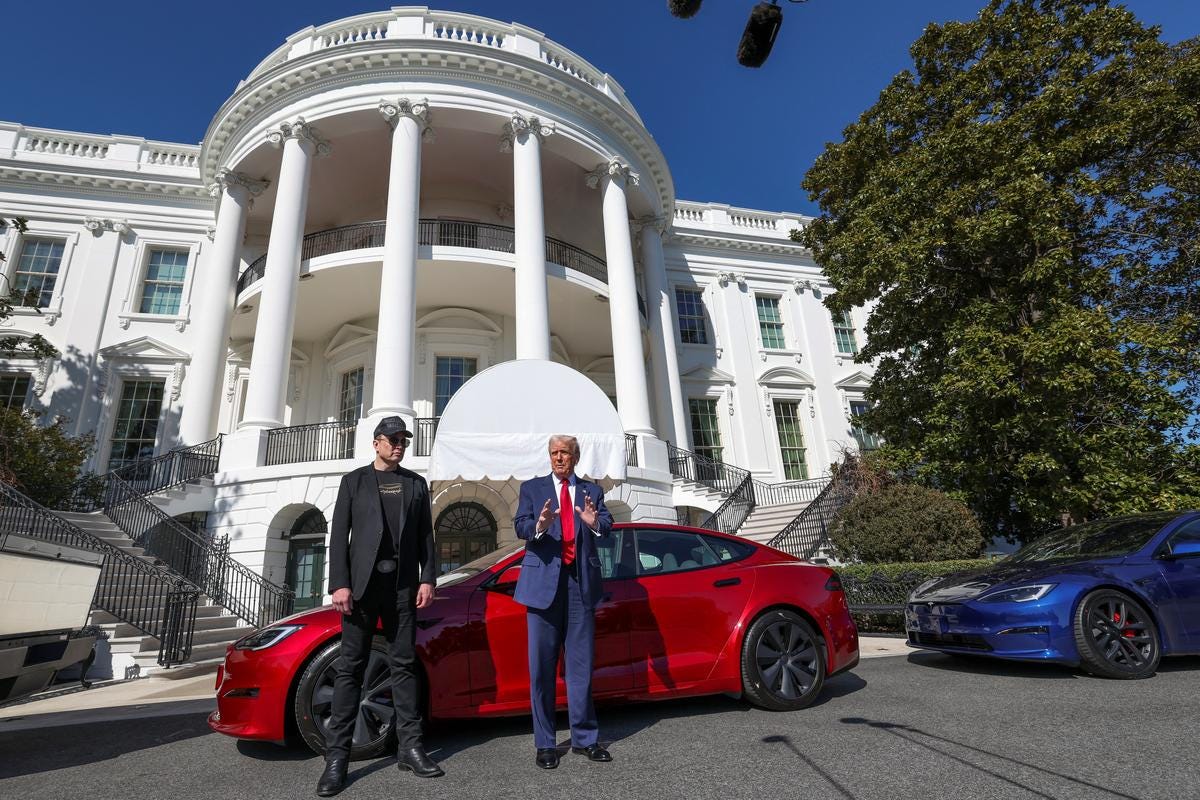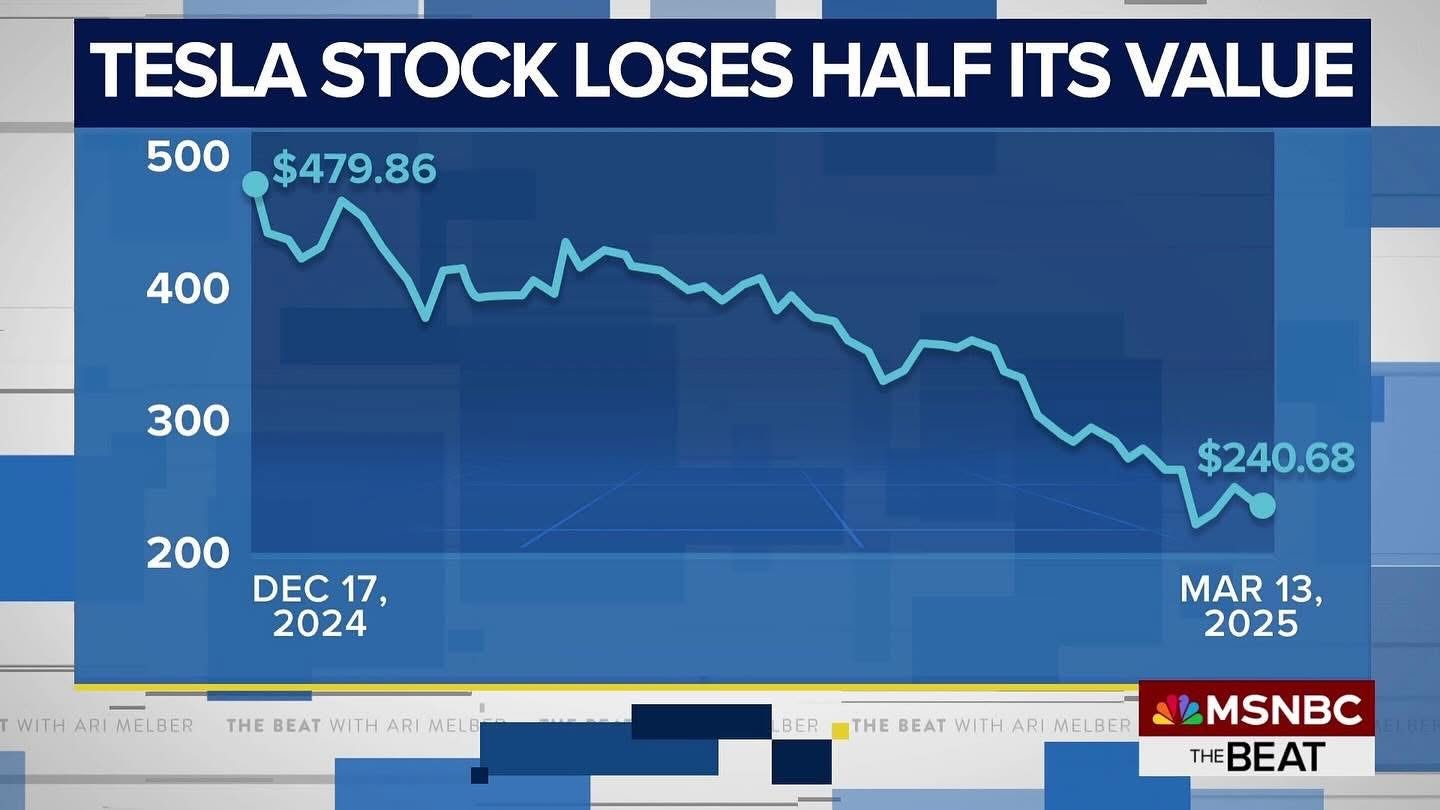Tesla’s Great Unraveling: Elon Musk, Donald Trump, and the Political Flip-Flop of the Decade
How Financial Turmoil and Political Opportunism Are Reshaping the Future of Electric Vehicles
Tesla, once celebrated as the embodiment of technological innovation and sustainable energy, is experiencing one of its darkest financial chapters. In fewer than four months, Tesla's stock price has plunged nearly 50%, dropping from $479.86 on December 17, 2024, to $240.68 on March 13, 2025. This precipitous decline has vaporized over $100 billion from Elon Musk’s once seemingly untouchable fortune and now threatens to upend his leveraged financial maneuvering, notably his controversial acquisition of Twitter.
This crisis isn’t merely about fluctuating share prices—it's deeply interwoven with a stunning political reversal spearheaded by former President Donald Trump and his political allies. Previously outspoken critics of renewable energy and EVs, Trump's camp has dramatically shifted gears, suddenly embracing Musk and Tesla as crucial allies. This strategic pivot exposes the volatile intersection between political interests and corporate financial stability.
Tesla’s Financial Freefall: Behind the Numbers
The dramatic devaluation of Tesla’s stock isn’t a random market fluctuation—it results from a confluence of investor panic, consumer apprehension, and Musk’s contentious financial strategies. Since Musk’s $44 billion Twitter acquisition, heavily leveraged through loans backed by Tesla shares, investors have grown wary. Margin calls—requirements by lenders to secure the value of leveraged loans—intensified selling pressure, creating a vicious cycle. Additionally, reduced demand, supply chain instability, increasing competition in the EV market, and a general economic slowdown exacerbated Tesla’s market vulnerability.
Financial disclosures underscore Musk’s precarious position: over 60% of his net worth was directly linked to Tesla stock. As shares spiraled downward, Musk was forced to sell significant portions of his holdings to meet margin obligations, further accelerating Tesla’s stock decline. Experts liken Musk’s financial entanglements to "dominos lined up precariously"—when one falls, the rest rapidly follow.
Trump’s Political Flip-Flop: Hypocrisy Unmasked
The irony of Donald Trump’s sudden support for Tesla is astonishing. Throughout his political tenure, Trump ridiculed renewable energy, dismissing electric vehicles as impractical and economically unsound. Famous for derisively mocking windmills and accusing EV owners of elitism, Trump vocally supported fossil fuels and dismantled environmental regulations that benefited renewable companies.
Yet now, with Musk’s finances critically unstable, Trump and his conservative allies have abruptly rebranded themselves as staunch Tesla supporters. Recent public appearances of Trump alongside Musk and Tesla vehicles, including the Cybertruck, demonstrate this unprecedented political reorientation. Trump's allies echo this newfound enthusiasm, painting Tesla as a symbol of conservative innovation, freedom, and American enterprise—ironically contradicting their previous stance.
Trump’s shift is transparently strategic, motivated by protecting Musk’s financial stability and, by extension, securing Twitter as a conservative-leaning communication channel. This alignment reveals a core principle in modern political-financial dynamics: ideology rapidly takes a backseat when financial self-interest becomes paramount.
Elon Musk’s Role: Distraction, Controversy, and Alienation
A critical factor fueling Tesla’s decline is Musk’s own behavior. His outspoken political stances, erratic Twitter engagement, and increasingly controversial public persona have alienated crucial investor segments and consumers. Musk’s frequent political provocations and aggressive interactions on social media have amplified investor fears that Tesla’s brand—and Musk’s leadership—may be a liability.
Additionally, Musk’s politicization of Tesla through his outspoken support of polarizing figures has driven a wedge into consumer loyalty, alienating core demographics who valued Tesla primarily for its environmental commitments rather than its CEO's political theatrics. Recent market surveys reveal a pronounced shift among Tesla consumers, who increasingly cite Musk’s controversial conduct as a key deterrent to their brand loyalty.
EV Market and Tesla’s Vulnerabilities: A Broader Economic Context
Tesla’s collapse also reflects broader economic pressures on the EV market. Once the uncontested leader in electric vehicles, Tesla now faces formidable competition from legacy automakers like General Motors, Ford, Volkswagen, and startups like Rivian and Lucid. Rapid expansion of EV offerings by traditional automakers, coupled with aggressive pricing strategies and superior dealership networks, places unprecedented pressure on Tesla’s previously untouchable market dominance.
Moreover, the expiration of key EV subsidies, supply chain issues exacerbated by geopolitical tensions, and battery material shortages have driven production costs up significantly. This perfect storm of increased competition, rising costs, and diminishing governmental support has significantly impacted investor confidence in Tesla’s ability to maintain profitability and market leadership.
Defensive Deflections and Historical Ironies
As Tesla’s stock plunged, prominent groups like the Tesla Owners of Silicon Valley have resorted to peculiar defense strategies. In attempts to mitigate criticism, they highlighted troubling historical connections of legacy automakers, such as Volkswagen and BMW, to Nazi Germany—a bizarrely irrelevant deflection clearly illustrating panic rather than substantive defense.
Rather than providing investor reassurance, this desperate strategy has drawn ridicule, intensifying skepticism regarding Tesla’s internal coherence and leadership judgment. Far from restoring confidence, these distractions further underscore the volatility and fragility currently defining Tesla’s public perception.
Risks and the Road Ahead: Is the Political Support Sustainable?
While Trump’s sudden backing may temporarily stabilize investor sentiment, substantial questions remain regarding the longevity and impact of this political maneuver. Historically, sudden ideological reversals based purely on financial convenience have rarely proven stable long-term solutions. This temporary alignment may alienate more consumers than it attracts, given its transparent transactional nature.
Regulatory risks also loom large. Tesla faces increasing scrutiny from federal agencies examining its Autopilot technology, labor practices, and Musk’s public disclosures. Combined with volatile investor sentiment, Tesla must navigate these hurdles carefully to avoid further stock depreciation.
Conclusion: Money, Politics, and Ideological Expediency
Tesla’s dramatic financial fall and Trump’s subsequent embrace of the company vividly illustrate the complicated relationship between corporate finance, political opportunism, and ideological expediency. Musk’s risky financial strategies and contentious public persona, coupled with broader EV market pressures, have set the stage for Tesla’s profound crisis. Trump's strategic pivot reveals an uncomfortable yet undeniable truth: ideological purity frequently succumbs to financial interests when power and profits are on the line.
Ultimately, this saga underscores how corporate valuations, political allegiances, and individual reputations are more intertwined than ever before. For Tesla, Musk, Trump, and investors alike, the question remains: Can strategic political alliances rescue a fundamentally shaken company, or will this political flip-flop become yet another liability hastening Tesla’s financial unraveling? Only time, and Tesla’s next financial quarter, will tell.




